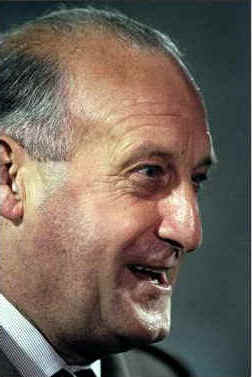Fixtures
Reports
Players
Transfers
Rumours
NewsNow
Table
Stats
Reserves
Academy
Archives
Bez
Club info
Fanzines
Last Season
SJP
Small Ads
Unlikely Lads
Teletext
A-Z Index
faces defeat in extra time
First appeared in the Sunday Times 05.05.02
 John Hall, the 69-year-old soccer boss who
built the Metro Centre is watching his empire crumble.
John Hall, the 69-year-old soccer boss who
built the Metro Centre is watching his empire crumble.
The Geordie dream is over. The private
business empire of Sir John Hall, Tyneside's biggest cheerleader looks to be
in a fragile state. At the peak of his power in the early 1990's, Hall was
the most high-profile businessman ever to have come out of the region.
He banked about £70m after selling his stake in the Metro Centre, the huge
retail complex on the outskirts of Gateshead, and embarked on a grandiose
plan to turn Newcastle into the "European city of sporting
culture". The scheme attracted much publicity and the self-made
multi-millionaire thrived on it.
He bought Newcastle United football club and spent millions of pounds adding
rugby, basketball and ice hockey teams. But Hall's vision has long since hit
the buffers. With the exception of the football club, his sporting interest
have been sold.
Now a question mark hangs over the future of Hall's private company, Cameron
Hall developments. It has missed two deadlines for filing its accounts, and
12 days ago it asked for more time again. Companies House says "It is
in breach of the Companies Act and it could be prosecuted if it doesn't
comply."
Much of Cameron Hall's assets are tied up in Newcastle United and there is
speculation that some of the group's shareholding has been pledged to banks
(thought to be Bank of Scotland and Barclays) as collateral for loans.
If this is the case, the shares could now be worth less than the value of
the loans. Five years ago, when the club floated, its value peaked at £200m
but it has since slumped to £35m.
A spokesman for Newcastle United declined to comment on the ultimate
ownership of the shares.
He said "We concentrate on running the
football club. Cameron Hall's affairs are its own, like our 20,000 other
shareholders."
The Hall family, through a variety of ownerships, controls about 48% of
Newcastle United's equity, but in the past few weeks the family has been
reducing Cameron Hall's stake and buying it back in a personal capacity.
On March 21, it sold 12.12m shares, equivalent to 8% of Newcastle United, at
33p. These were acquired by Hall, but he is already sitting on a paper loss
as the price has dropped to 23.5p.
Four days later Cameron Hall sold a further
3% stake to Copia, of which his son, Douglas, is a director. Cameron Hall
now owns just 4.2% of the club.
Hall is still widely respected in the northeast of England, as he has done
more to promote the region in the past 20 years than almost anyone else. But
the 69 year old must be saddened by the way his business career is drawing
to a close.
Local businessmen say Hall has temporarily moved back to the northeast from
Marbella to sort out his family company. Despite repeated telephone calls to
the group's stately home headquarters at Wynyard Hall, we were unable to
contact him for comment. But there remains persistent speculation that all
the group's assets are up for sale. What would then remain of Hall's empire
is unclear.
The accounts filed at Companies House for the year ending November 1999 show
debts of about £40m. The accounts details two loans - one for £9m, which
attracts payments of nearly £1m every six months, the other for £6m, with
monthly repayments of £72,000. Hall himself has also lent £2m to the
company.
It would be wrong to say the Hall family has run out of money, but it is
clear that a big dent has been made in its fortune. Also, one of its main
sources of income, dividends from its Newcastle United shares has just been
cut.
Last year, even though the club was under financial pressure, the group
raised its dividend by 18%. This raised eyebrows, and at the half-year stage
he board reduced the payout to 0.8p a share.
Local businessmen say the rot set in five years ago when Hall's son,
Douglas, then a director at Newcastle United and his co-director, Freddy
Shepherd, brought disgrace on the club after being caught by a Sunday
newspaper in a Spanish brothel. They were also secretly taped making
ill-judged comments about several high-profile Newcastle employees. The
club's credibility was damaged and its share price tumbled.
Vinay Bedi, a football analyst at Wise Speke, says "If you look at
the businesses and the wealth Hall has built up, you can hardly call him a
failure. He has probably suffered from a succession issue more than anything
else."
For a man with such good intentions, Hall, who was born into a mining
family, would surely have wanted a cleaner exit. But the uncertainty
surrounding the ownership of shares in Newcastle United will ensure that the
speculation continues.
John Waples